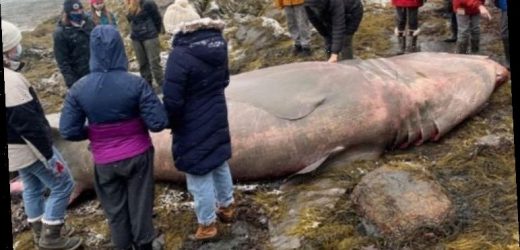We will use your email address only for sending you newsletters. Please see our Privacy Notice for details of your data protection rights.
Fishermen in the Greenland Cove in Maine were stunned to find the corpse of a huge shark on the shores. The shark in question is a basking shark – the second biggest of all its relatives. And this one in particular is a monster at 26ft – or almost eight metres long.
That makes it more than four times the length of the average human male.
Images of the spectacular animal show that it has slight decay, but otherwise it is still in all its glory.
Several people took to social media to speculate on what the shark was doing – although few in the Twittersphere were taking the animals death seriously.
One person wrote: “Was it Covid-19?”
Another person said: “I’d say it’s basking in the sun.”
A third added: “No basking on the Maine beaches per Governor Janet Mills … beach basking can increase risk of Covid.”
The Maine Department of Marine Resources collected samples from the animal to determine how it died.
Samples will also be used to determine its diet, age and genetic analysis.
Basking sharks can grow to a staggering 40ft (12 metres) making it the second biggest fish in the ocean, only dwarfed in size by its cousin the whale shark.
The beasts can weigh up to seven tonnes and are mainly found in cooler waters.
They do not pose a threat to humans as they are ‘filter feeders’.
Basking sharks swim through the ocean with their three ft wide jaw gaping, feeding small crustaceans, invertebrate larvae, and fish eggs.
However, humans do pose a threat to basking sharks.
DON’T MISS
Shark breakthrough: Scientists stunned by prehistoric great white find
Shark attack news: Australia records most killings for 90 years
WW2 ship found after crew savaged in ‘history’s worst shark attack’
The WWF said: “Basking sharks have been exploited in targeted fisheries for many years.
“These fisheries typically demonstrate an unsustainable ‘boom and bust’ pattern, where high initial catches are followed by the collapse of the fishery.
“Recovery from depletion is extremely slow, and some populations do not appear to have recovered even decades after fishing operations have ended.
“Most targeted fisheries have now ceased as a result of stock collapse or legal protection.
“The only targeted fishery now in operation is the Norwegian fishery, in which catches are in decline.”
Source: Read Full Article






